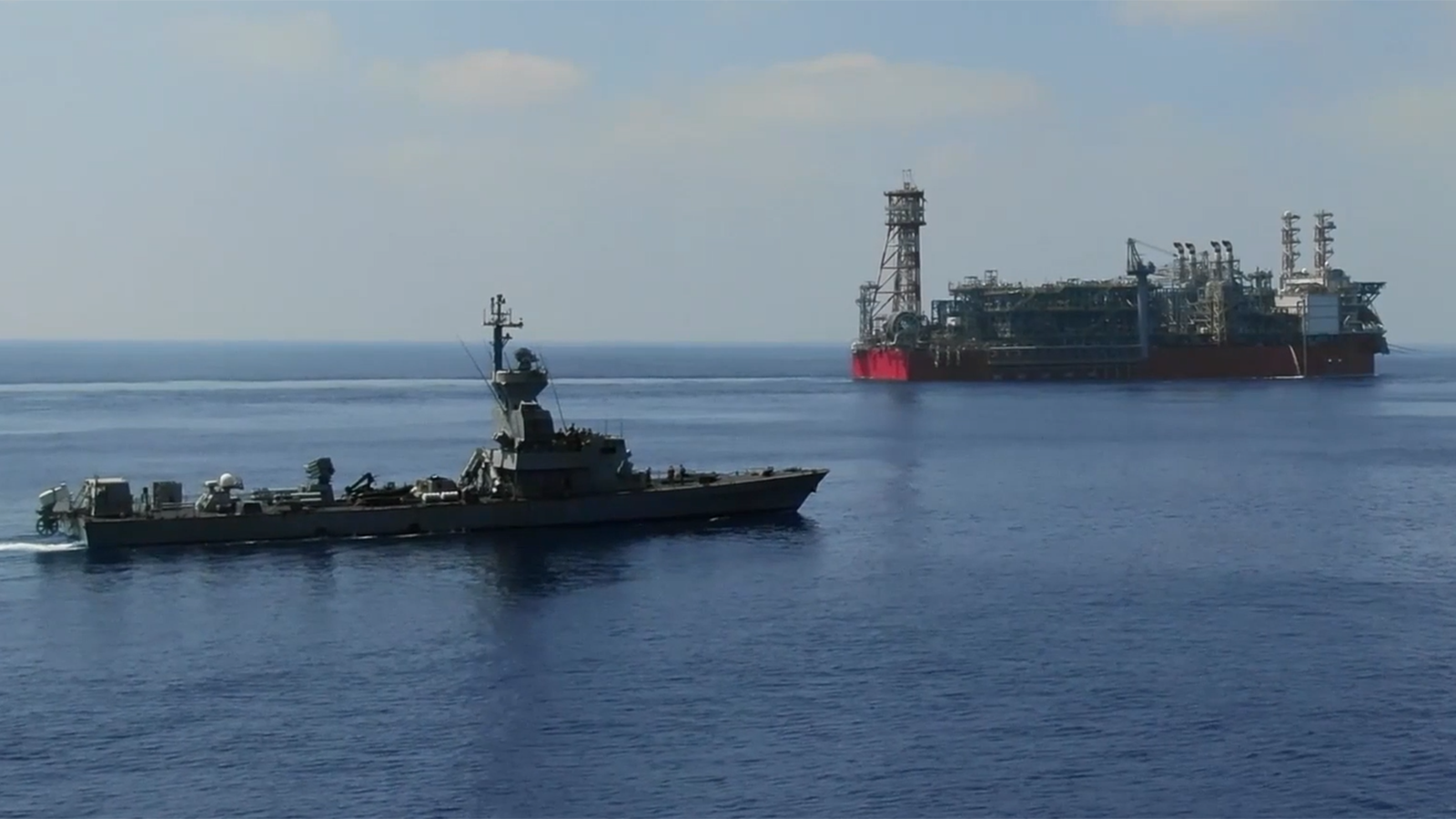
Israeli ships are seen the vicinity of the Karish gas rig, in a video published by the IDF. (Screenrab)
TEL AVIV — Israeli defense forces have been ordered on alert in the country’s north following the breakdown of negotiations between Israel and Lebanon regarding a gas rig, the latest surprising twist that brought the dispute over the huge gas reservoirs in the Mediterranean to a potential boiling point.
Israel Defense Minister Benny Gantz ordered the alert Thursday, telling troops to “prepare for a scenario of escalation in the north, both offensively and defensively, given the developments in the negotiations on the maritime border.”
“Whether the agreement is signed or not, we are prepared to protect our infrastructures and our sovereignty,” Gantz said. “If Hezbollah seeks to damage them — the military price that the state of Lebanon and Hezbollah will pay will be very heavy.”
The alert marks a stark turn in the odyssey of the Karish gas rig ordeal, which days ago appeared on its way to US-led resolution, with both Israel and Hezbollah leader Hassan Nasrallah expressing support. But in the days since, Israel reportedly voiced reservations about the deal, then the Lebanese government suggested changes, which caused Jerusalem to outright reject the amended version.
There always remains the potential for a diplomatic solution — as Breaking Defense has reported, analysts have said neither side is looking for a conflict at this point — and Middle East expert Uzi Rabi downplayed to Breaking Defense the possibility of Hezbollah taking serious action.
But the head of Mossad reportedly told Israeli lawmakers that Nasrallah may feel forced to act to save face, after previously pledging to block the rig’s operation.
As such, Israel has already deployed military assets to the area and is preparing for a number of different potential scenarios, according to Israeli defense sources.
Those assets include the nation’s new SAAR-6 corvette ships, which are among Israeli vessels patrolling the area with their air defense capabilities, the sources said. Some of the ships are seen in a video published online by the IDF. The Israeli air force is keeping continuous watch, using both reconnaissance aircraft and satellites, over suspected missile and armed UAV sites in Lebanon.
The IDF is preparing for at least three potential scenarios: First, that when the rig goes operational, Hezbollah might strike it with armed UAVs. (In July, Israel said it had shot down three UAVs belonging to Hezbollah heading to the area of the rig.) Second, Israel is worried Hezbollah might strike the rig with missiles based in Lebanon. The third, and most serious option, is that Hezbollah would launch a missile barrage on Israeli territory.
Should any of the three happen, the sources said, it’s likely the Israeli response would be dramatic. The IDF has an updated “target bank” that the sources said would be used to retaliate, or even for a preemptive strike should an attack appear imminent.
In late September, US Secretary of State Antony Blinken reportedly told Saudi officials that if Hezbollah takes even a relatively small action, the US would not be able to stop an Israeli response.
But such a scenario is not a foregone conclusion. Writing over the summer, Orna Mizrahi and Yoram Schweitzer, two senior researchers from the Israeli Institute for National Security Studies (INSS), said at this stage it is not clear if Hezbollah intends to carry out its threat, in light of likely Israeli and international responses to such a move.
“In addition to the possibility of an Israeli military response and the potential for escalation, which would severely harm Lebanon’s interests when Lebanon is already in one of the worst crises it has ever faced, attacking a facility owned by [London-based] Energean would further harm Hezbollah’s international status,” the duo wrote.
Air Force picks Anduril, General Atomics for next round of CCA work
The two vendors emerged successful from an original pool of five and are expected to carry their drone designs through a prototyping phase that will build and test aircraft.


























